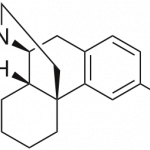addiction
Ion channels, chica.
Hat Tip: Virginia Hughes. Who also has something interesting on Coffee.
Notorious was having a little conversation with some friends, and someone asked a strange question: why would one want to abuse over-the-counter (OTC) medications such as Robitussin? OTC cold medication abuse is pretty common and the subject of considerable comment in pop culture -- not the least of which are a great song by MC Chris ("The Tussin") and one of the funniest clips in the show South Park ever (below the fold). The question wasn't so much about why those crazy kids do what they do, but rather what is the pharmacological mechanisms behind its effects?
So I wanted to write a…
For my DC peeps: I've been helping one of my colleagues with an event for college journalists, to be held next Friday at NIH (Bethesda, MD). It's a roundtable discussion on the challenges of covering addiction issues; scheduled guests include Lisa Stark of ABC News, Lauran Neergaard from the AP, and Jacqueline Duda of the WaPo, as well as scientists from NIH, NIDA, the University of Maryland and the University of Michigan. The event is free and open to college students at regional institutions of higher learning.
There is still some space left, so if you know any DC-area college students who…
...or so goes the refrain of the addict. I was going to put up a more substantive, well-researched post, but I wanted to give you a few weekend thoughts to chew on.
I deal with addictions a lot, but the most common and deadly one is tobacco. Tobacco is responsible for millions of serious illness and deaths every year in the U.S., all of which are preventable. But, like other substance use disorders, we don't really know how to talk about tobacco addiction (which is more properly "nicotine addiction"). There is no doubt that nicotine is powerfully addictive, and the health and social…
Recently, a discussion has sparked on ScienceBlogs over how the word "addiction," could be used to describe some substances that aren't necessarily harmful such as antidepressants. Scicurious from Neurotopia points out that if a substance changes one's physical self, there will be physical effects if that drug is discontinued—a property of addiction. Likewise, PalMD from Denialism Blog suspects the negative nature of the word "addiction" may make drug companies hesitant to describe their products as such, even though it's accurate.
tags: chocolate, addiction, alcoholism, craving
Orphaned image.
Weirdly, I just learned that recovering alcoholics, especially those who are early in the recovery process, are recommended to eat chocolate to curb their craving for alcohol. According to my sources, this recommendation is included in the book, Alcoholics Anonymous, which is also known as "The Big Book" to those who are in recovery. Why is this?
Some people hypothesize that chocolate is helpful because it contains a variety of alkaloids that are linked to alcoholism, so by eating chocolate, the alcoholic can get these same…
You don't see this every day:
Jake at Pure Pedantry draws due attention to an incredible case report in the American Journal of Psychiatry showing that a lesion in a patient's brain cured the patient's drug addiction, apparently by knocking out the reward circuit that made the addiction pleasurable. (It also made the man badly depressed.)
A stroke that destroyed parts of a drug addict's globus pallidus (pale areas) left him depressed but ended his addiction. Neither drugs nor (alas) wine gave him pleasure any longer.
The article, unfortunately, is pay-per-view, but Jake's summary is…
